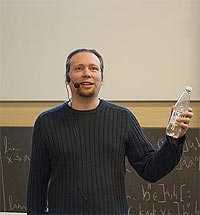News production becomes automatic – meta editors are coming
In order to serve the increasingly demanding audiences in multiple digital channels, media houses are trying to automate the most routine editorial work. This way, the editors can concentrate on writing more challenging special stories and giving their audiences opportunities to immerse themselves in increasingly personalized news experiences.

The University of Helsinki and VTT Technical Research Centre of Finland Ltd will research automatic news production where a personalised news experience is enabled by data and machine learning. Hyper locality and audience participation are the key elements here.
“Semi-automatic solutions will be the common practice: the editor will finalise the automatically produced text and define templates for automatic news generating programs. In the future, all editors will be, to some extent, meta editors”, believes VTT’s research professor Caj Södergård.
The degree of automation rises gradually
So far, automation has been trialed in news production by big actors, such as the American press agency AP (Associated Press), with writing analyses of financial statements for example. In addition to financial news, sports news is already automatically produced around the world.
“One can expect that producing other types of news can be automated up to a certain point depending on the availability of data. More demanding journalism – such as leading articles and in-depth articles – will remain the task of human journalists,” states the journalism researcher Carl-Gustav Lindén from Swedish School of Social Science, part of the University of Helsinki.
“The University of Helsinki studies how data science can be applied to news production and its automation. We develop tools based on data mining and machine learning for journalists to streamline their work,” tells professor Hannu Toivonen from the department of computer science at University of Helsinki.
VTT Technical Research Centre of Finland Ltd studies how automatically produced content affects the audience and what promotes and prevents an immersive experience. VTT is also responsible for the demonstration of a news ecosystem and studies new ways to distribute content in cooperation with the technology companies participating in the project.
The main financier of the Immersive Automation project is Tekes through their Media remake program. Other financiers of the project are Media Industry Research Foundation of Finland, The Swedish Cultural Foundation in Finland, Sanoma, Alma Media, Conmio, Keski-Pohjanmaan Kirjapaino, and KSF Media as well as the research institutions.
Immersive Automation project website: immersiveautomation.com
Photo: Cata Portin

 The instruction at the Department of Computer Science continues in the limelight; this time in the form of personal recognition, as the student union at the University of Helsinki has awarded the Magister Bonus prize of 2011 to University Lecturer Matti Luukkainen. Matti was interviewed about teaching and studying by Ella Peltonen from TKO-äly immediately after the festivities.
The instruction at the Department of Computer Science continues in the limelight; this time in the form of personal recognition, as the student union at the University of Helsinki has awarded the Magister Bonus prize of 2011 to University Lecturer Matti Luukkainen. Matti was interviewed about teaching and studying by Ella Peltonen from TKO-äly immediately after the festivities. As announced by Nokia on Thursday 22 September 2011, Henry Tirri had been appointed Chief Technology Officer at Nokia and Executive Vice President of the Nokia Leadership Team, effective from that date. According to the bulletin, ‘As Chief Technology Officer, Tirri assumes responsibility for the CTO organization, charged with setting Nokia's technology agenda both now and in the future, and driving core innovation to enable business development opportunities.”
As announced by Nokia on Thursday 22 September 2011, Henry Tirri had been appointed Chief Technology Officer at Nokia and Executive Vice President of the Nokia Leadership Team, effective from that date. According to the bulletin, ‘As Chief Technology Officer, Tirri assumes responsibility for the CTO organization, charged with setting Nokia's technology agenda both now and in the future, and driving core innovation to enable business development opportunities.” The Linkki centre opened at the Helsinki University Department of Computer Science last Friday. The centre offers all kinds of fun activities like games programming, and an online programming course open to all upper-secondary students, starting at the beginning of next year.
The Linkki centre opened at the Helsinki University Department of Computer Science last Friday. The centre offers all kinds of fun activities like games programming, and an online programming course open to all upper-secondary students, starting at the beginning of next year.